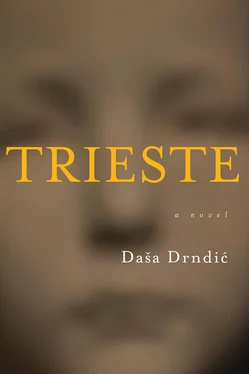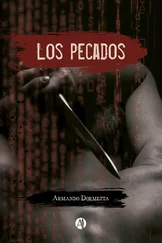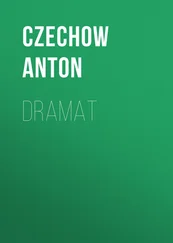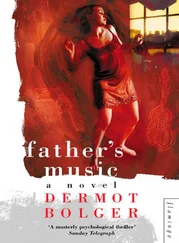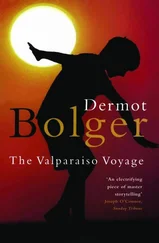O Lord Thou pluckest
so all she says is
HURRY UP PLEASE IT’S TIME
Haya sits and rocks by a tall window in a room on the third floor of a building from the time of Austria-Hungary in the old part of Old Gorizia. The rocking chair is old and as she rocks, it whimpers.
Is that the chair whimpering or is it me? she asks the deep emptiness, while she turns over the letter from Helga Mathias, and lying around her everywhere are lives which have dropped like old L.P.s that have played what they have to play. Photographs, papers, posters, letters and little objects from which oozes a thick, sticky silence. And the sole remaining snapshot, cracked, on which the infant Antonio Tedeschi’s face is fractured, as if in a broken mirror.
Then Haya says, The red basket is empty. I have cleared out the years. I see the bottom.
Space has turned into time — Zum Raum wird hier die Zeit. Oh, daughters of the Soča, the essence of reality lies in its multiplicity. Every convergent series is limited. The number a is the limes, the border value of the function f when x tends toward a, lim (x) = A , oh yes.
What are the roots that clutch, what branches grow
Out of this stony rubbish? Daughter of woman,
You cannot say, or guess, for you know only
A heap of broken images…
Yes, a heap of broken images.
So, Don Baubela did not keep his word. He betrayed Haya’s secret; which may turn out to have been for the best in the end, which may have pointed to a trace, which may have contributed to the end of the story. For sixty-two years Haya Tedeschi has been waiting.
On Via Aprica, where until recently there was a butcher’s shop, a café bar called Joy has opened facing the building in which Haya lives. What a coincidence, Haya says, while through the window she sees the first guests nibble at their antipasti with slivers of salmon and beads of black caviar. Her stationery shop Gioia, this café Joy, the letter from Mrs Helga Mathias, as if the path is narrowing as it approaches the jumping-off point from which a person vanishes.
haya is riding a bicycle through the woods. the green leaves shine so brightly that beams bounce off them and penetrate her skin, crawl under her eyelids and pour over her ageing organs, wrap them in the fragrance of the soca. the wheels spin ever faster, her eyes fill with wind, a strange song floats in her head, a chorale soft and sunny. what a stupid song, says haya, angels don’t exist. she keeps missing the pedals, a fist in haya’s breast tightens while she clutches the handlebars, the path is white and uneven, the wheels spin quickly, quicker and quicker. haya lets go of the handlebars, haya flings her arms open in the wood, lifts her feet from the pedals, spreads her legs towards the woods, raises her head to the sky, flies, she flies through the rhomboid images of a kaleidoscope. there in the corner, squinting through this cardboard box of interwoven charms, haya sees her life as it crouches and waits, as it stares at her with dry, wide-open (lidless) eyes. commotion, in her head commotion. via aprica narrows to a glowing arrow. the arrow flies and embeds itself in Haya’s eye, turns into a tiny globe reflecting the sign: Joy
Those roads were echoes and footsteps,
women, men, agonies, resurrections,
days and nights,
half dreams and dreams,
every obscure instant of yesterday
and of the world’s yesterdays,
the firm sword of the Dane and the moon of the Persian,
the deeds of the dead,
shared love, words,
Emerson and snow and so many things.
Now I can forget them. I reach my centre,
my algebra and my key,
my mirror.
Soon I will know who I am.
I squeeze shut my lidless eyes
and wait.
HURRY UP PLEASE IT’S TIME

On Friday, 30 June, 2006, I leave Salzburg for Gorizia.
It is night. The train glides along, lit from the inside and nearly empty. I move through the black silence, through the fragrance of summer, through a silence which envelops itself, which pours slowly and lazily across the earth and sky, everywhere around us.
A woman sits opposite me, smiling as she looks out the window into the dense nothing glued to the windowpane, into a breath that sways behind us, which follows us like a wind-borne shroud. Going to Gorizia? the woman asks me. Why?
I say nothing.
The woman has on heavy shoes, winter shoes, she is wearing them on bare feet with no laces. The woman has firm hands, thick hair, black, and she’s about forty. There is neglect on her face.
I have four voices I recognize, the woman says, three which are someone else’s and one which is mine.
Oh, I want to say, just don’t speak of voices, not of voices.
Now my voices are quiet, the woman says, so we can talk, she says, but I don’t feel like talking, in my lungs, like colourful ribbons, my voices are dancing mischievously, thin, wheezy and cacophonic voices, which clench my breathing, and I feel like beating myself hysterically on the chest in order to dislodge these intruders and send them fluttering off into the night. I am not in the mood to talk, I say.
Are you originally from Gorizia? continues the woman, as if she doesn’t hear what I am saying, and I tell her I don’t know. I don’t know , I say to the woman who is sitting opposite me and travelling with me to Gorizia and who irritates me, because I don’t want to talk, I don’t feel like talking, and this woman keeps asking, she keeps asking, It remains to be seen whether I am from Gorizia or not , I tell the woman, and she goes on as if I hadn’t said a word. If you are from Gorizia , she says, I may know you. Many people in Gorizia know each other, and I tell her that I doubt it, that I truly doubt our paths have ever crossed anywhere, at any time. I doubt it, I say, and she concludes philosophically, Reality is intertwined and boundless, reality is indivisible like my voices. And coincidences are rare , says that woman on the train to me. Reality is a skein that knits us in, entangles us , says this woman who is bothering me by this time, and then, thank goodness, we arrive in Gorizia and I bid her goodbye.
I stay at the Palace Hotel at Corso Italia 63, for 31 euros a night. The row of trees my window looks out on is dense and deeply green. I ask them to bring to my room a portion of gubana goriziana and a bottle of Picolit. I will lie in the half-dark and caress the golden-yellow thickness with my tongue, the fragrant heft of that discreetly chilled, discreetly dignified Picolit, which they bring me, this is what I have in mind. The taste and fragrance of dried figs, honey, vanilla, wild flowers, peaches, acacia, red and black berries, the warmth and softness of dry-sweet acidity, the tartness of the little oak barrels in which the hundred-year-old fragrance of the Gorizia forests will course through my body, slide to the tips of my toes and back into my breath, to the depth of my eye sockets in which waters of the past are sloshing like blurry mirrors with portraits of my unknown ancestors. Picolit is a miraculous wine. One shouldn’t drink it frequently. Picolit is a delicate wine, a wine of the European nobility, the exclusive nectar of meditation, always produced in small quantities. Picolit is an ancient wine born during the Roman Empire, and it preserves its history in the records of Antonio Zanoni from 1767. I know all sorts of facts about Picolit, a heap of useless details. Later, Picolit imparts serenity and a quiet joy to the already peaceful aristocracy of Germany, France and England. Picolit is an ever-changing but perfect symphony, a unique jewel, which will bring me, I believe soundlessly, painlessly now, after such a long wait, to the scarred past, mine and that of my family, so alien to me. Picolit must be imbibed in solitude, because Picolit is made by courageous vintners for refined palates. So much for Picolit.
Читать дальше
